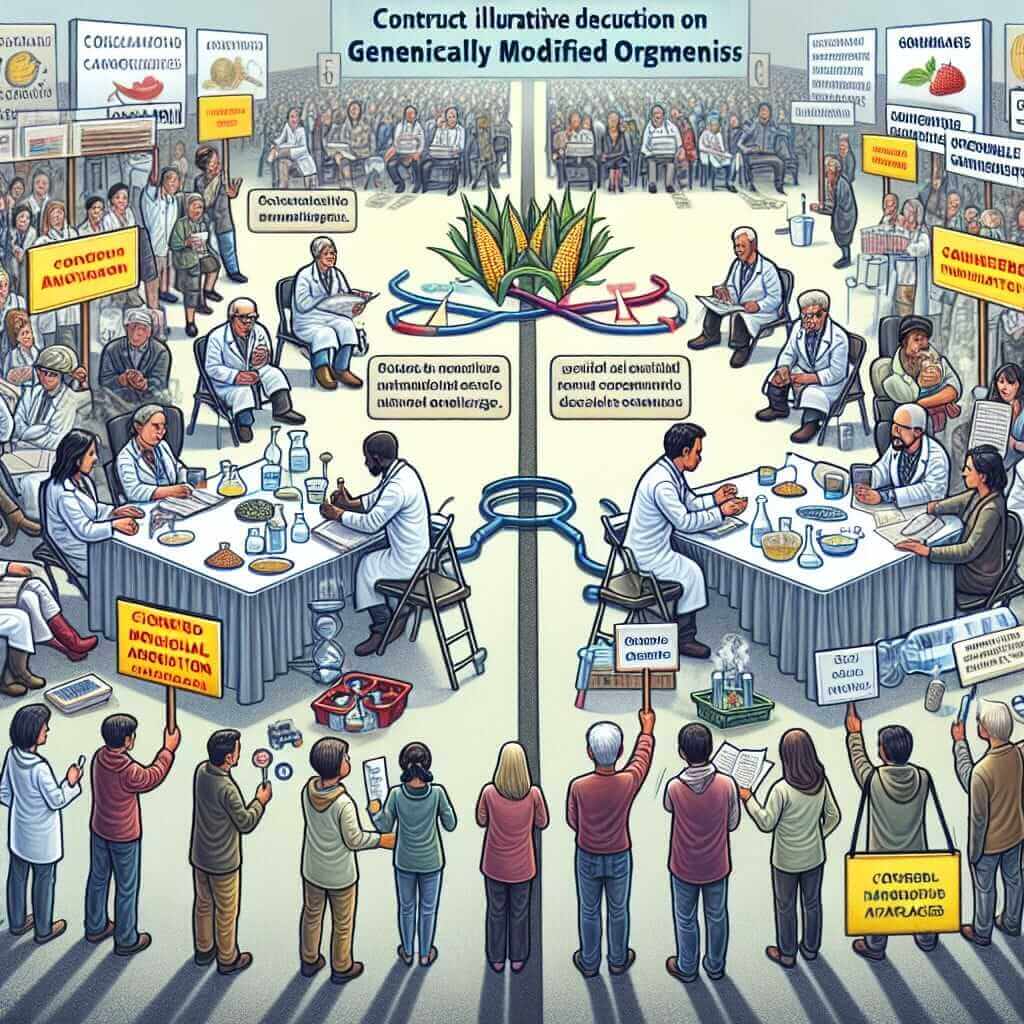The use of genetically modified organisms (GMOs) is a hotly debated topic, raising complex ethical questions that frequently appear in IELTS writing and speaking exams. As seasoned IELTS instructors with over 20 years of experience, we’re here to equip you with the knowledge and vocabulary to confidently tackle this issue.
Understanding Genetically Modified Organisms (GMOs)
Before delving into the ethical considerations, it’s crucial to understand what GMOs are. A GMO is any organism whose genetic material has been altered using genetic engineering techniques. This often involves inserting a gene from one organism into another, even across different species, to introduce a desired trait.
Example: A common GMO is Bt corn, which has been modified with a gene from the bacterium Bacillus thuringiensis. This gene allows the corn to produce a protein that is toxic to certain insects, reducing the need for pesticides.
Ethical Implications: A Multifaceted Issue
The ethical implications of using GMOs are numerous and complex, sparking debate worldwide. Let’s examine some of the key concerns:
1. Environmental Risks and Unforeseen Consequences
One primary concern is the potential for unintended environmental consequences.
Example: The introduction of GMOs into ecosystems could lead to a loss of biodiversity, the emergence of herbicide-resistant “superweeds”, or harm to beneficial insects.
IELTS Connection: In the IELTS Writing Task 2, you might be asked to discuss the environmental impacts of GMOs. You can use the example above to illustrate your points.
2. Human Health Concerns
Questions about the long-term impact of GMOs on human health remain. Some worry about potential allergic reactions, the transfer of antibiotic resistance genes, or unknown health effects that haven’t been fully studied.
Example: Critics often point to the lack of long-term studies on the effects of consuming GMOs, arguing that more research is needed to ensure safety.
IELTS Connection: This topic could appear in IELTS Speaking Part 3, where you may be asked to discuss your opinions on food safety and technology.
3. Economic and Social Justice Issues
The use of GMOs raises concerns about corporate control over the food supply and the potential for economic disadvantage for small farmers who may not have access to these technologies.
Example: The patenting of GMO seeds by large companies could make it difficult for small farmers to compete, potentially leading to a loss of livelihoods.
IELTS Connection: This issue could be relevant for IELTS Writing Task 2 questions about globalization, food security, or the impact of technology on society.
4. Ethical Concerns about Genetic Manipulation
Some people object to the very idea of genetically modifying organisms on moral or religious grounds. They argue that it is ethically wrong to interfere with nature in this way.
Example: Certain religious groups believe that genetically modifying organisms is akin to “playing God” and disrupts the natural order.
IELTS Connection: This ethical dimension could be explored in IELTS Speaking Part 3, where you may be asked to discuss different cultural or religious perspectives on scientific advancements.

Common IELTS Errors to Avoid
- Generalizations: Avoid making sweeping statements about GMOs being entirely “good” or “bad.” The issue is nuanced, and your answers should reflect this.
- Lack of Examples: Always support your points with specific examples. Referencing examples like Bt corn or the debate surrounding Monsanto demonstrates a deeper understanding.
- Vocabulary Errors: Be precise with your vocabulary. Use words like “genetically modified organisms,” “genetic engineering,” “biotechnology,” and “ethical implications” accurately.
Practice Makes Perfect
To excel in your IELTS exam when this topic arises, consider these practice ideas:
- Brainstorm: Create a list of arguments for and against the use of GMOs.
- Vocabulary Builder: Compile a glossary of terms related to GMOs and their ethical implications.
- Mock Speaking Test: Practice answering potential IELTS Speaking questions on this topic with a study partner or tutor.
- Sample Essay: Write a practice essay addressing the question: “To what extent do the benefits of genetically modified organisms outweigh the drawbacks?”
A Final Word
The ethical implications of using GMOs are multifaceted and thought-provoking. By understanding the different perspectives, equipping yourself with relevant vocabulary, and practicing your responses, you’ll be well-prepared to achieve your desired IELTS score.
Ready to delve deeper into more IELTS topics? Explore our website for a wealth of resources and expert guidance: [link to a relevant article within ielts.net, such as one about technology or ethics]. We’re here to support your journey to IELTS success!